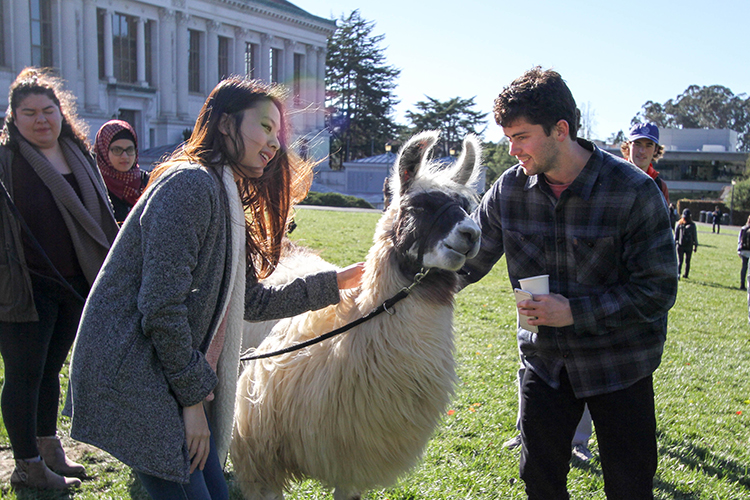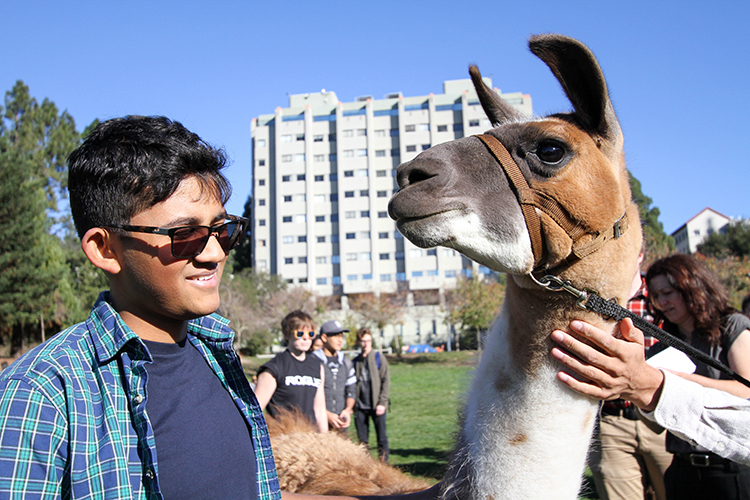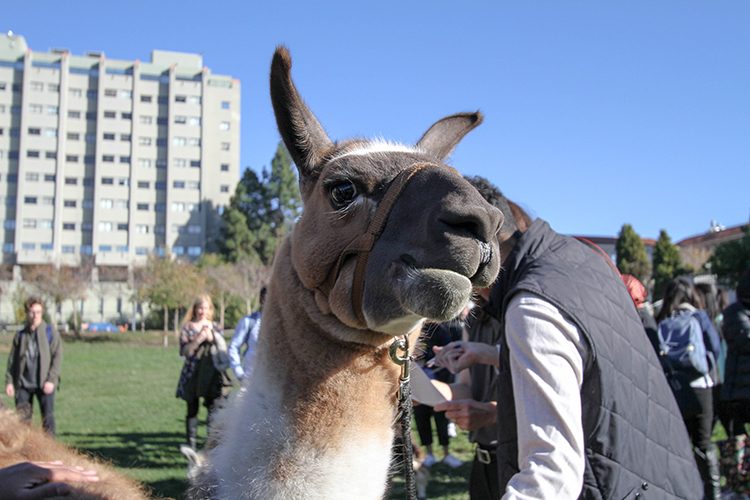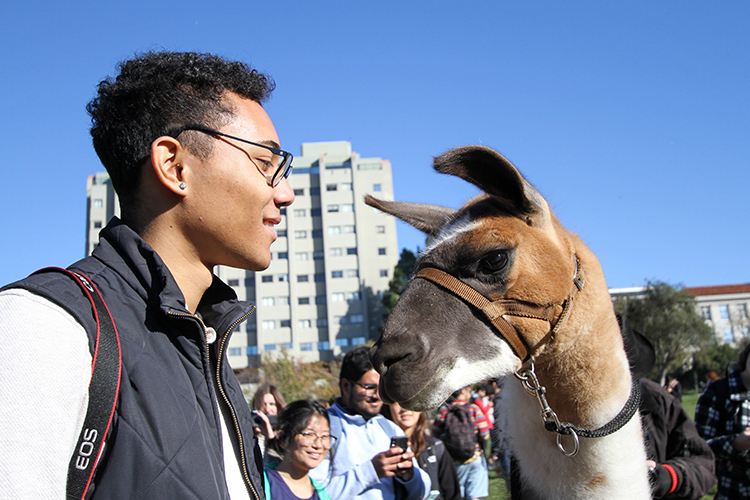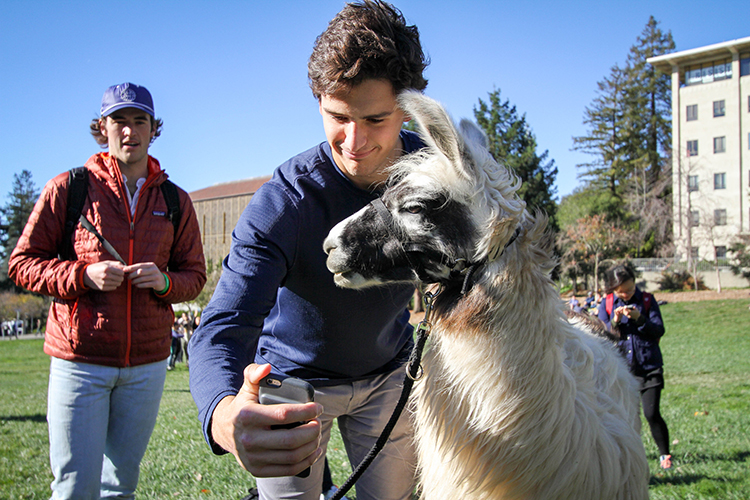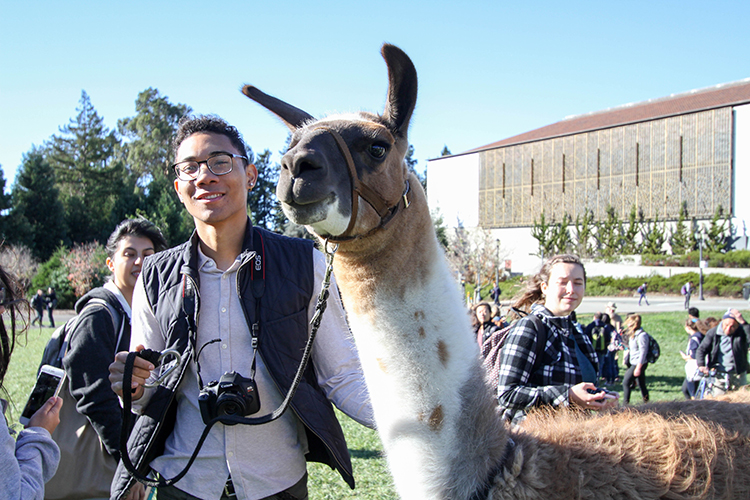
UC Berkeley students spent the afternoon destressing with four llamas on Memorial Glade. The program was sponsored by the student government and designed to help students relax during finals week. (UC Berkeley photo by Sara Yogi)
Freshman Maja Ahmann was on her way to study for finals when her friend suggested they stop by Memorial Glade for a brief break from stress. Maybe a nap in the sun, or a game of Frisbee?
Nope, something better was in store: llamas.
As part of the De-Stress Week before finals, which start next week, UC Berkeley’s student government spent $400 to bring four llamas to Memorial Glade for three hours Monday afternoon. The glade is right next to the 24-hour library during so-called dead week, when a crushing load of term papers and unread lecture notes can cause blood pressure to skyrocket.
“I didn’t know llamas were so soft and cuddly. It made me feel better about finals week,” said Ahmann, a double major in psychology and legal studies. “Petting any animal brings me joy, but seeing these animals up close is amazing.”
Llama wrangler Geo Caldwell drove all the way from Sonora to deliver the four llamas, something he’s been doing during finals week at Berkeley for the last four years.
“Here you have so many really great people from so many different cultures, and they can open their hearts to the llama,” he said, as dozens of bleary-eyed students swarmed around his four camelids. “Your chakra, your heart, it just opens up and you can see the students all feel better.”
The program was organized by Ana Claire Mancia, a junior undergraduate business student who works in the student government’s office of academic affairs. She said the idea of bringing llamas to campus first started several years ago, and has continued to be a big hit.
“Students get very stressed out and they tend to be under a lot of pressure, and as part of our office we really care about mental health,” she said. “So we asked ourselves what can we can do to help students destress before finals? What is something that students will come see and something that will make them interested?”
“Llamas are really the most random thing you can think of, so it does the job of bringing students out,” she added.
Caldwell, who doesn’t find llamas random, said he loved that his llamas dragged students out of the library. He also returns to campus during suicide prevention week.
“I know the stress the students are under, so I want to be here,” he said. “Plus there’s community here: if you like llamas and I like llamas then we get to be here together and we have something to talk about.”
Meanwhile inside the library, students were finding ways to avoid distraction: turning in their phones for a digital, social-media blackout.

Cheyenne Canizares, left, and Isabella Blanco turn in their smartphones during the Blackout Challenge at Moffitt Library on Dec. 4, 2017. (Photo by Jami Smith for the University Library)
The program, which was also put on by the student government, rewarded students with pillows, blankets or sleep masks if they were able to stay away from their phones for as long as four hours. Students could give their phone to an independent minder and, for as long as they could stand it, study without distraction.
By 2 p.m. more than 150 students had participated.
“We’re about the run out of blankets,” said Sabrina Jones, another member of the student government who organized the phone blackout. “Some people can’t make it all four hours, so we have prizes if they can at least do two or three.”
Brendan Deas, a sophomore environmental economics and policy major, turned in his phone at 10:30 a.m. By 2:30 p.m., he was ready to get out of the library.
“I was less distracted not having it,” he said, annoyed a reporter was asking him questions while he was trying to catch up on messages. “I kept reaching for it while I was trying to study.”
Finals run until Friday, December 15. The Student Learning Center has a guide for students who are struggling to focus, and the University Health Services offer counseling for stress and other mental health issues.
Contact Will Kane at [email protected]
